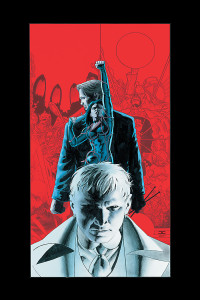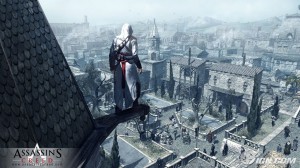This is a big week. An awesome week. On Sunday, July 13th, we rolled cameras for the first time on Writer’s Circle: the Webseries, the ongoing adventures of playwright Phil Payton, novelist Becky Porter, screenwriter Jeff Winnick, and blogger Zoe Jordan, as they share a sort of support group for writers hosted by their agent Tina Gellar.
And appropriately enough, we have reached the point in the Danny Writes Plays saga where I first thought “I should write another play with that Phil guy.” So let’s take a look at U-Boat of the Soul.
What’s it about?
Playwright Phil Payton was last seen in Two Guys, a Couch, and the Fate of the World, co-writing a spy play about Dirk Rhombus and his assistant Trina (based quite clearly on his girlfriend Tina). We rejoin Phil years later: he is now writer-in-residence for a theatre company, reporting to his now quite firmly ex-girlfriend Tina. They broke up for good and all six months ago, and three months after that the company commissioned a new script from him. It’s due tomorrow, and he’s barely started. Years after the unnamed Dirk Rhombus comedy of Two Guys, he’s decided to return to that well in a desperate attempt to crank out something, anything, that will fill this contract.
Turns out, one of the company’s other producers, Jacob Garrison (previously seen in Pride and Prima Donnas) has found a rising talent in Becky Porter, and is pushing for her to potentially replace Phil. Director David Locke (also from Pride and Prima Donnas) wants to keep Phil around (if only to prevent another Dance Into the Fire: the Duran Duran Rock Opera incident), but thinks Becky’s not only a strong talent, but a potential way for Phil to get over Tina. Frustrated that Tina’s willing to fire him and that David’s trying to hook him up with his possible replacement, Phil retires to his office in an attempt to write an entire Dirk Rhombus adventure in one night.
Only problem… Dirk hates this plan. Having popped up here and there to explain to the audience such crutches as exposition, supporting cast, pop culture references, and scene changes, Dirk starts berating Phil, claiming that he can do better than this, and takes Phil on a journey to show what Dirk’s adventures can teach audiences about the world, and Phil about himself.

Trina returns, but refuses to be Phil’s punching bag for his feelings about Tina. Jacob becomes Dirk’s boss, reluctantly pulling him out of retirement, despite thinking the espionage world no longer has a place for him. David becomes Jacques, the informant who warns that Dirk’s mission is not all it seems. And Becky becomes Katya, another lead who echoes Jacques’ warnings while also attacking society’s demonization of female sexuality (and through that, Phil’s fear of dating Becky) by deconstructing the “femme fatale” archetype. Phil’s gonna learn some things, and if you pay attention, you just might as well.
So why did that happen?
Sick of hearing about my divorce yet? Don’t worry, we’re almost through.
When my now ex-wife and I split up, I was concerned that, as someone who wrote primarily comedies and romances, this might impact my ability to do what do, a concern Phil shares in this script. A few months later, needing an idea for a writing contest, I pitched this concept to a friend, having already held workshops for Salvage and The Spy Who Left Me. He stared at me quizzically for a moment, then said “Seriously? You’ve tripled your output!”
A year and change later, I needed a new idea, so I came back to U-boat. Despite having made great strides in getting over the divorce, I thought the concept had legs, so as long as I was being indulgently autobiographical anyway, I filled it with characters from past scripts, references to other past scripts, and got to work.
Also, and let’s get this out of the way right up front… I was curious to see if I could write a nude scene and get away with it. Other writers might have no problem writing nude scenes, but having been directly involved in every production of one of my scripts up to that point, I knew that I’d never manage it unless I could look the actor and/or actress in the eye (as much as I’m ever able to, anyway) and say that yes, this is important. This is necessary. And since I was having Katya hold court against North American society’s idolization of sex/crippling fear of nudity (unlike enlightened, topless Europe), something that I’d been fuming about ever since Janet Jackson exposing her breast (not even the whole breast! There was a pasty!) at the Superbowl was viewed as a worse scandal than George W. Bush inventing a connection between Iraq and 9/11 to justify a war. I decided to call out society’s fear of women’s bodies, using Katya’s to drive the point home. (And also Jacob’s, because fair is fair.)
How’d it turn out?
All in all? Pretty decently. The humour’s solid, the only pop culture references are there to be made fun of for being pop culture references, it’s not a bad show. I mean, the whole thing’s pretty rushed. Didn’t even have an intermission, if I recall correctly, and I think that I do. Not that there’s a problem with the spy stuff being sped through, as the Dirk plot only matters as far as it provides the chance to deconstruct the Dirk plot.
Actually, about that.
The whole naked Katya-“why are women’s bodies terrifying” scene? It works. I believe that. It’s a good scene, it makes important points, it even works in the larger play’s context. Sure, Katya’s topless way longer than she needs to be. I can’t deny that. This was pointed out to me about a week before the original production opened, but by then it was too late to fix the problem on a script level. If this script were to re-surface, I’d find better places for Katya to ditch the bra and find her robe.
And the thing is, the scene works because it’s the best deconstruction of spy stories and the best attack on society. The rest of the scenes have their laughs, and advance Phil’s arc the way they need to, but by and large they’re over too fast and don’t say enough. Every scene should have the punch and insight that Katya’s scene does. Every character, inside Phil’s head or not, should be as interesting as I think Katya is. Especially Katya’s “real world” counterpart, Becky.
One time, Brian Michael Bendis wrote an essay claiming that the Green Goblin was not only the greatest Spider-man villain ever, but the greatest overall comic book villain, yet you’d never guess that from his ridiculous first appearance. So it is with Becky. She might be my favourite of all the female leads I’ve written, and you’d never guess that from this, her first appearance. It’s impossible to look at this script and not see it through the filter of Writers’ Circle, both the play and the impending webseries, and Becky the awestruck fangirl just does not measure up to the character we’re going to be filming over the next six weeks. It’s okay if she’s a fan of Phil. I’ll even grant that it’s okay if said fandom makes her want to date Phil, although come on man, are we inserting our own fantasy women again already? But she can and should be more than that.
Would you stage it again?
Not as it is. It can be deeper, stronger. It can say more, do more, and have well-written characters other than Phil and Dirk. Each time I get better at writing Phil, Becky, and Tina, I want to go back and make their earlier appearances work on the same level, and that would take some doing. And, yeah, like I said, if every scene isn’t as deep or cutting as Katya’s… well, why aren’t they? They just should be.
So, this one would need a polish. Not a full overhaul, and not a “burn it to the ground and start over on a white piece of paper,” but definitely a polish.
Repeated Theme Alert
- Man and woman cannot be friends: Becky likes Phil! David likes Tina! Everyone wants to date everyone! There are only six people in this cast and one of them’s fictional!
- The quiet, average guy the ladies unaccountably love: Well, one of the ladies stopped loving him, and at least Becky has an excuse. There actually is something interesting about Phil.
- So how is this one about your divorce? Don’t, don’t, don’t even start with me right now. You know. I know. We all know.
- Writing about writers: It wasn’t long after this script that a friend said “Maybe give the meta-narrative stuff a rest for a while.” Wasn’t terrible advice.



